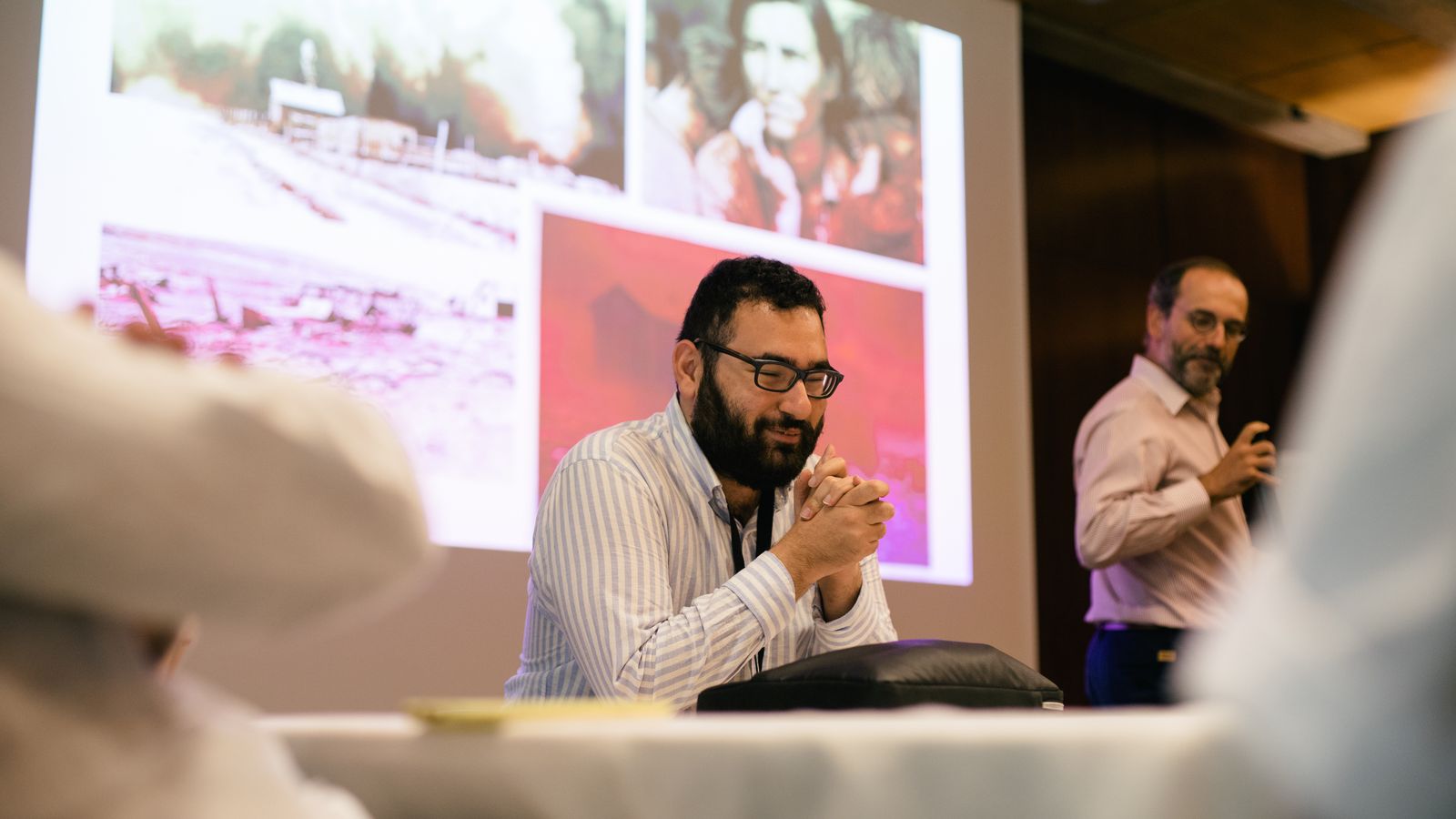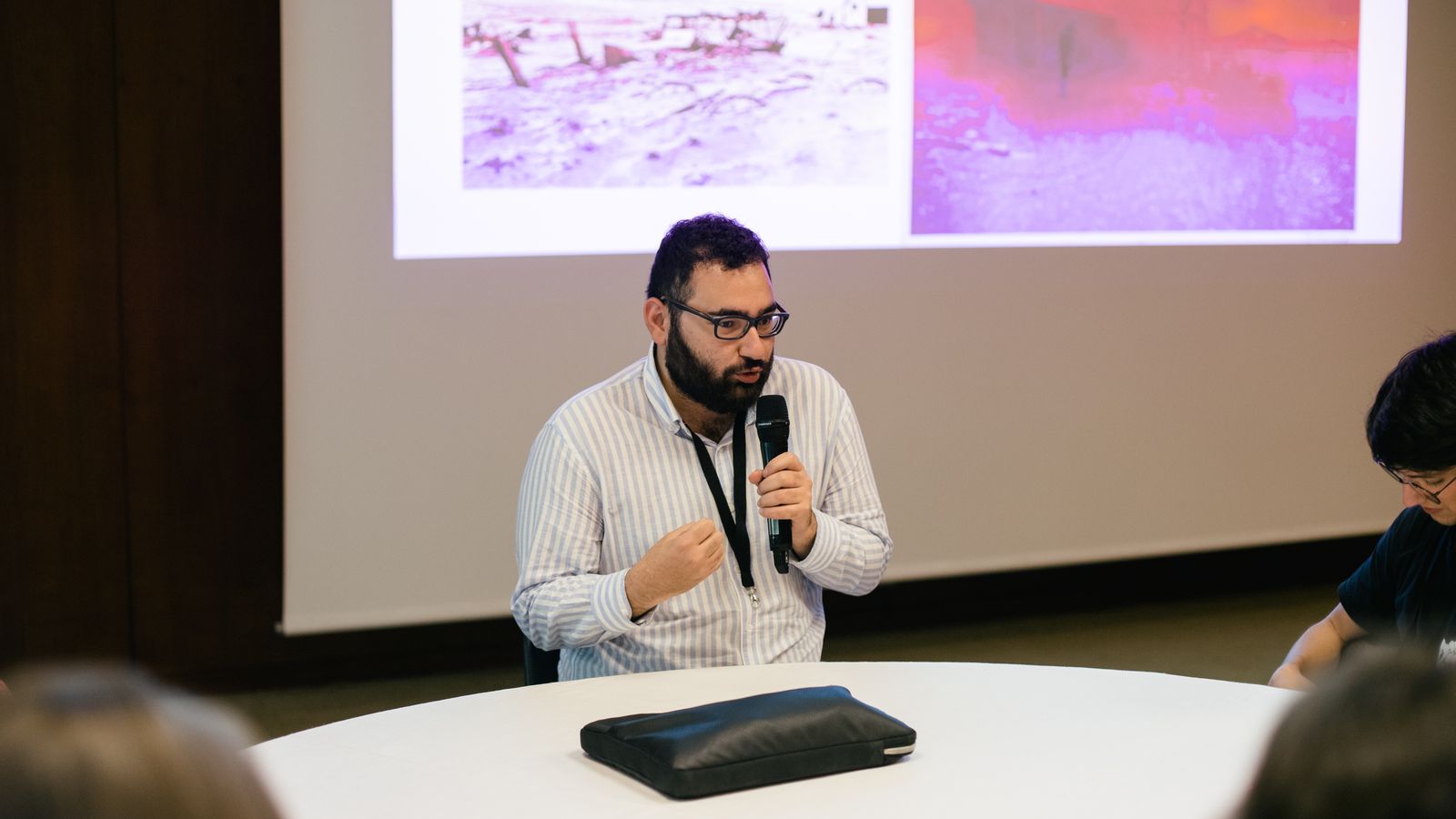Daniel Marques: “It’s very important to bring the science to the people”
Born and raised in Faro, Daniel Marques left his hometown to study philosophy in Coimbra. Halfway through his studies, he decided to swap the humanities for the exact sciences, always keeping a look over both perspectives. About to start his master’s degree in Biomedical Research in Lisbon, he tells us about his transdisciplinary profile and his love of combining scientific research with communication.
You finished your degree in Biology this year, but your initial choice of course was Philosophy. How did this change of interests come about?
Yes, I enrolled in Philosophy when I was 18. However, after a while I became very interested in neuroscience: during the summer I would read articles about neurodevelopment, the functioning of neuronal circuits or visual perception, for example. Although I understood some things, I felt that I was falling behind in others and progressively wanted to understand more. It was this curiosity that led me to think at the end of my second year of Philosophy: “Well, maybe my contribution would be better in the sciences”, and I thought I could bring some baggage from one area to the other, particularly in terms of communicating results and understanding concepts.
How did this transition happen? Do you think there is a close relationship between philosophy and biology?
Philosophy is often described as the mother of all sciences, isn’t it? It wasn’t until the 17th or 18th century, I think, that there was this split in relation to the natural sciences. But I would say that there is an intimate relationship, yes; in fact, there is even a philosophy subject in biology.
My interest was more in neuroscience, neurobiology, the philosophy of mind from a naturalistic or even physicalistic perspective. In other words, the idea that mental processes can be explained in the light of their physical substrate, and that in order to understand phenomena such as memory, consciousness or neuropsychiatric illnesses we have to resort to physical-chemical processes. It’s not by thinking about the mind that we’ll discover how it works, we really need to have these tools. And we are, in fact, in the perfect century to study the brain: we have everything from magnetic resonance imaging to molecular techniques that help us understand the activity of different genes… All of this fascinated me.
One of the themes you’re exploring with the Gulbenkian Scholarship is “the role of microglia in neurodevelopment”. Can you tell us what it consists of?
When we talk about microglia, we’re referring to immune system cells that reside in the brain parenchyma and are normally associated with defense functions. But when the body is not under attack, could the immune system have other functions? It has long been known that it does, but the effects that the immune system has on the brain still have some room for investigation. That was not my question directly, but the group I was part of, in Prof. João Peça’s lab, was precisely studying how microglia could shape neuronal circuits during postnatal development, for example, in an allergic response. Neuronal circuits are basically sets of neurons that are grouped together and perform a certain function. Microglia help in this process and an allergic response can alter their activity.
This has led me to have a growing interest in Immunology, which is an area I still know relatively little about. That is why I’m now following a Master’s in Biomedical Research at the Institute of Molecular Medicine in Lisbon.
So that will be your path from now on?
I don’t normally make those kinds of commitments [laughs]. I’m very interested in this question of how the immune system shapes other biological systems – in this case, the nervous system, neuro-immunology – and so it is a possible path. But I also think I’m at a stage where I’m discovering new interests within life sciences and I don’t want to have too closed a path. At the start of the Gulbenkian Scholarship, I had a certain idea about what I wanted to do, which has since expanded, between workshops and getting to know other projects, talking to different colleagues…
How important was this scholarship for your career?
It was of decisive importance from a financial point of view. It gave me the chance to take the animal experimentation course, which will start in September and is essential because it is the only one in Portugal that allows access to animal experimentation in all European countries. It’s quite expensive, so without this support from Gulbenkian I wouldn’t have been able to do it so early in my career. I know people with PhDs who don’t yet have this training and are therefore dependent on senior researchers; but I want to be independent, to be able to carry out the experiments and also have a better understanding, for example, of the ethical protocols involved when working with animals.
Another advantage of the scholarship was that it allowed me to take the Harvard programming course online, which is one of the best courses for learning to program and has the advantage of teaching you to think computationally, to solve problems. I think that’s a very positive thing, because nowadays it is necessary to have programming skills, particularly for data analysis and Machine Learning.
What has the experience of being part of the Gulbenkian network been like?
For the last six years I have mainly been in Coimbra, but I have kept in touch with colleagues in the Biology area. In fact, I answered a lot of questions on my master’s degree with a fellow grant holder, Germano, and this support was very positive. Otherwise, I probably wouldn’t be as comfortable coming to a city as big as Lisbon, because I’m used to very small cities (Faro, Olhão, even Coimbra), where you see the same people doing the same routes and routines every day. That is not something I feel is happening here in Lisbon: every day, when I go to the subway, I see different people, and that’s a bit uncomfortable for me. Hence the need to have some peer support from people who are in the same situation as me, but a little more advanced, who serve as mentors, informally.

Outside of academia, do you have any other interests or activities?
I can say so, although I think that everything I do is related in one way or another. I have recently started a science communication project, which is separate from academic interests, but related to them: it’s a YouTube channel called That Biologist, where I communicate different scientific concepts – for example, the last video was about DNA origami – and try to explain it in accessible terms, while also teaching some of the biology behind the process. I will not always have time because it’s a lot of work, but I want to keep uploading one video a month.
Another personal project is writing. In my spare time I write and read a lot, and at the moment I am working on a crime novel.
There is a lot of talk these days around the relevance of knowing how to communicate science. Is that a role you see yourself playing in the future?
Yes, it’s something I would really like to do. I love doing experiments, but I can perfectly see myself communicating science. If this YouTube channel worked really well, my dream would be to have a team where we could produce content and also do some research. I think it’s very important that we bring science to the people. I’m very interested in applied science, but basic science is also fundamental if we want to develop potential applications later on. Raising this public awareness is essential in order to demystify and deconstruct certain concepts, and to combat misinformation.
Where do you see yourself in five or 10 years’ time?
That’s a difficult question. I would love to do a PhD, for personal fulfillment and also to make my contribution to science. I would like to do it abroad, I don’t know exactly where yet, in this area of Biomedical Research, more related to Neurobiology or Immunology or a combination of the two. Another component that interested me in the last year of my degree was the area of localized drug delivery, on a more biotechnological level… So I have a few ideas, but I think the master’s degree will be decisive in determining this path.
You still seem to have a lot of open doors. That’s good!
It is. Sometimes I find it worrying not to be exactly sure, but on the other hand, it can also be liberating, because it means I don’t have to be tied down to one thing. Science is very diverse, and a transdisciplinary profile like mine, which has this component of philosophy combined with biology, allows me to work with people from different areas and establish points of communication. That’s something I definitely see myself doing: developing ambitious projects that cross different areas and allow everyone to talk to each other, which is something that doesn’t always happen in the sciences. Sometimes one laboratory is very isolated from another, or scientists don’t read each other’s work.
For example, in Translational Biology and Biomedicine, my group managed to get several authors communicating to develop a very bold research concept: a microrobotic therapy that could deliver antioxidants to prevent the neurodegeneration associated with Alzheimer’s disease. From there came an idea that may not even work, but which is immensely interesting because it opens doors, doesn’t it? Basically, I would love to have more knowledge, to specialize more, to be able to build these bridges in a more realistic way.


